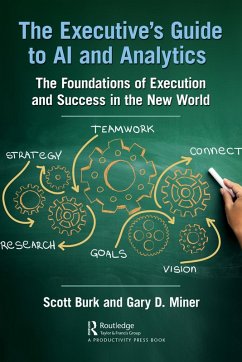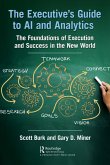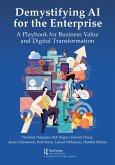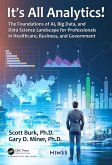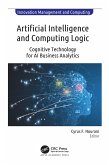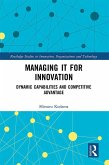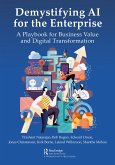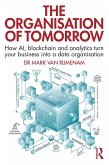Scott Burk, Gary D. Miner
The Executive's Guide to AI and Analytics (eBook, PDF)
The Foundations of Execution and Success in the New World
31,95 €
31,95 €
inkl. MwSt.
Sofort per Download lieferbar

16 °P sammeln
31,95 €
Als Download kaufen

31,95 €
inkl. MwSt.
Sofort per Download lieferbar

16 °P sammeln
Jetzt verschenken
Alle Infos zum eBook verschenken
31,95 €
inkl. MwSt.
Sofort per Download lieferbar
Alle Infos zum eBook verschenken

16 °P sammeln
Scott Burk, Gary D. Miner
The Executive's Guide to AI and Analytics (eBook, PDF)
The Foundations of Execution and Success in the New World
- Format: PDF
- Merkliste
- Auf die Merkliste
- Bewerten Bewerten
- Teilen
- Produkt teilen
- Produkterinnerung
- Produkterinnerung

Bitte loggen Sie sich zunächst in Ihr Kundenkonto ein oder registrieren Sie sich bei
bücher.de, um das eBook-Abo tolino select nutzen zu können.
Hier können Sie sich einloggen
Hier können Sie sich einloggen
Sie sind bereits eingeloggt. Klicken Sie auf 2. tolino select Abo, um fortzufahren.

Bitte loggen Sie sich zunächst in Ihr Kundenkonto ein oder registrieren Sie sich bei bücher.de, um das eBook-Abo tolino select nutzen zu können.
Professionals are challenged each day by a changing landscape of technology and terminology. In recent history, especially the last 25 years there has been an explosion of terms and methods born that automate and improve decision-making and operations.
- Geräte: PC
- ohne Kopierschutz
- eBook Hilfe
- Größe: 4.12MB
Andere Kunden interessierten sich auch für
![The Executive's Guide to AI and Analytics (eBook, ePUB) The Executive's Guide to AI and Analytics (eBook, ePUB)]() Scott BurkThe Executive's Guide to AI and Analytics (eBook, ePUB)31,95 €
Scott BurkThe Executive's Guide to AI and Analytics (eBook, ePUB)31,95 €![Demystifying AI for the Enterprise (eBook, PDF) Demystifying AI for the Enterprise (eBook, PDF)]() Prashant NatarajanDemystifying AI for the Enterprise (eBook, PDF)52,95 €
Prashant NatarajanDemystifying AI for the Enterprise (eBook, PDF)52,95 €![It's All Analytics! (eBook, PDF) It's All Analytics! (eBook, PDF)]() Scott BurkIt's All Analytics! (eBook, PDF)61,95 €
Scott BurkIt's All Analytics! (eBook, PDF)61,95 €![Artificial Intelligence and Computing Logic (eBook, PDF) Artificial Intelligence and Computing Logic (eBook, PDF)]() Cyrus F. NouraniArtificial Intelligence and Computing Logic (eBook, PDF)136,95 €
Cyrus F. NouraniArtificial Intelligence and Computing Logic (eBook, PDF)136,95 €![Managing IT for Innovation (eBook, PDF) Managing IT for Innovation (eBook, PDF)]() Mitsuru KodamaManaging IT for Innovation (eBook, PDF)39,95 €
Mitsuru KodamaManaging IT for Innovation (eBook, PDF)39,95 €![Demystifying AI for the Enterprise (eBook, ePUB) Demystifying AI for the Enterprise (eBook, ePUB)]() Prashant NatarajanDemystifying AI for the Enterprise (eBook, ePUB)52,95 €
Prashant NatarajanDemystifying AI for the Enterprise (eBook, ePUB)52,95 €![The Organisation of Tomorrow (eBook, PDF) The Organisation of Tomorrow (eBook, PDF)]() Mark van RijmenamThe Organisation of Tomorrow (eBook, PDF)34,95 €
Mark van RijmenamThe Organisation of Tomorrow (eBook, PDF)34,95 €-
-
-
Professionals are challenged each day by a changing landscape of technology and terminology. In recent history, especially the last 25 years there has been an explosion of terms and methods born that automate and improve decision-making and operations.
Dieser Download kann aus rechtlichen Gründen nur mit Rechnungsadresse in A, B, BG, CY, CZ, D, DK, EW, E, FIN, F, GR, HR, H, IRL, I, LT, L, LR, M, NL, PL, P, R, S, SLO, SK ausgeliefert werden.
Produktdetails
- Produktdetails
- Verlag: Taylor & Francis eBooks
- Seitenzahl: 138
- Erscheinungstermin: 7. Juni 2022
- Englisch
- ISBN-13: 9781000596298
- Artikelnr.: 63752267
- Verlag: Taylor & Francis eBooks
- Seitenzahl: 138
- Erscheinungstermin: 7. Juni 2022
- Englisch
- ISBN-13: 9781000596298
- Artikelnr.: 63752267
- Herstellerkennzeichnung Die Herstellerinformationen sind derzeit nicht verfügbar.
Scott Burk has been solving challenging business and health care problems for over 25 years. He has held a variety of executive and senior level positions in Engineering, Operations, Academia, IT, Finance, eCommerce, Sales and Marketing. He is currently a thought leader and data scientist at TIBCO and has affiliations at multiple universities. Previously, he was Associate Vice Present and Chief Statistician at Baylor, Scott and White Health Plan and previously was Associate Executive Director of Information Systems (BI, DW and Quality) at Scott and White Healthcare System. He was also Chief Statistician at Overstock.com, a Decision Science Manager for Texas Instruments, Senior Manager in Risk Modeling for PayPal, eBay as well as startups. He has held faculty positions at Texas A&M and Baylor University. His education includes MBA (The University of Texas at Dallas), MS in Data Mining (CCSU) and a PhD Statistics (Baylor University). Undergraduate in Chemistry and Biology (Texas State University). Currently, in addition to TIBCO he teaches Predictive Analytics in the MS Data Science Program at CUNY. He is also on the faculty at University California Irvine in the Healthcare Analytics program. He resides with his wife and children in Central Texas. He is a national presenter in healthcare quality and improving outcomes at conferences and symposia. He has written on analytics and data science topics, but has spend most of his time, "in the trenches applying techniques and listening to practitioners' problems and gaps." He has designed curriculum at Southern Methodist University (SMU) for Data Science in Finance and worked for Northwestern University. Dr. Gary Miner received his B.S. from Hamline University, St. Paul, Minnesota with biology, chemistry and education majors; M.S. in Zoology & Population Genetics from the University of Wyoming, and his Ph.D. in Biochemical Genetics from the University of Kansas as the recipient of a NASA Pre-Doctoral Fellowship. During the doctoral study years, he also studied mammalian genetics at The Jackson Laboratory, Bar Harbor, ME, under a College Training Program on an NIH award; and another College Training Program at the Bermuda Biological Station, St. George's West, Bermuda in a Marine Developmental Embryology Course, on an NSF award; and a third College Training Program held at the University of California, San Diego at the Molecular Techniques in Developmental Biology Institute, again on an NSF award. Following that he studied as a Post-Doctoral student at the University of Minnesota in Behavioral Genetics, where, along with research in schizophrenia and Alzheimer's Disease, he learned "how to write books" from assisting in editing two book manuscripts of his mentor, Irving Gottesman, Ph.D. (Dr. Gottesman returned the favor 41 years later by writing two tutorials for this PRACTICAL TEXT MINING book). After academic research and teaching positions, Dr. Miner did another two-year NIH-Post-Doctoral in Psychiatric Epidemiology and Biostatistics at the University of Iowa where he became thoroughly immersed in studying affective disorders and Alzheimer's Disease. All together he spent over 30 years researching and writing papers and books on the genetics of Alzheimer's Disease (Miner, G.D., Richter, R, Blass, J.P., Valentine, J.L, and Winters-Miner, Linda. FAMILIAL ALZHEIMER'S DISEASE: Molecular Genetics and Clinical Perspectives. Dekker: NYC, 1989; and Miner, G.D., Winters-Miner, Linda, Blass, J.P., Richter, R, and Valentine, J.L. CARING FOR ALZHEIMER'S PATIENTS: A Guide for Family & Healthcare Providers. Plenum Press Insight Books: NYC. 1989). Over the years he held positions, including professor and chairman of a department, at various universities including The University of Kansas, The University of Minnesota, Northwest Nazarene University, Eastern Nazarene University, Southern Nazarene University, Oral Roberts University Medical School where he was Associate Professor of Pharmacology and Director of the Alzheimer Disease & Geriatric Disorders Research Laboratories, and even for a period of time in the 1990's was a visiting Clinical Professor of Psychology for Geriatrics at the Fuller Graduate School of Psychology & Fuller Theological Seminary in Pasadena, CA. In 1985 he and his wife, Dr. Linda Winters-Miner [author of several tutorials in this book] founded The Familial Alzheimer's Disease Research Foundation [aka "The Alzheimer's Foundation] which became a leading force in organizing both local and international scientific meetings and thus bringing together all the leaders in the field of genetics of AD from several countries, which then lead to the writing of the first scientific book on the genetics of Alzheimer's Disease; this book included papers by over 100 scientists coming out of the First International Symposium on the Genetics of Alzheimer's Disease held in Tulsa, OK in October, 1987. During part of this time he was also an Affiliate Research Scientist with the Oklahoma Medical Research Foundation located in Oklahoma City with the University of Oklahoma School of Medicine. Dr. Miner was influential in bringing all of the world's leading scientists working on Genetics of AD together at just the right time when various laboratories from Harvard to Duke University and University of California-San Diego, to the University of Heidelberg, in Germany, and universities in Belgium, France, England and Perth, Australia were beginning to find "genes" which they thought were related to Alzheimer's Disease. During the 1990's Dr. Miner was appointed to the Oklahoma Governor's Task Force on Alzheimer's Disease, and also Associate Editor for Alzheimer's Disease for THE JOURNAL OF GERIATRIC PSYCHIATRY & NEUROLOGY, which he still serves on to this day. By 1995 most of these dominantly inherited genes for AD had been discovered, and the one that Dr. Miner had been working on since the mid-1980's with the University of Washington in Seattle was the last of these initial 5 to be identified, this gene on Chromosome 1 of the human genome. At that time, having met the goal of finding out some of the genetics of AD, Dr. Miner decided to do something different, to find an area of the business world, and since he had been analyzing data for over 30 years, working for StatSoft, Inc. as a Senior Statistician and Data Mining Consultant seemed a perfect "semi-retirement" career. Interestingly (as his wife had predicted), he discovered that the "business world" was much more fun than the "academic world", and at a KDD-Data Mining meeting in 1999 in San Francisco, he decided that he would specialize in "data mining". As Gary delved into this new "data mining" field, and looked at statistics text books in general, he saw the need for 'practical statistical books' and started writing chapters and organizing various outlines for different books.
Chapter 1
Introduction
Sources of Failure Chapter 2
AI and Analytics Failure and How to Overcome It Chapter 3
The Six Foundations for AI and Analytics Success
Introduction
Sources of Failure Chapter 2
AI and Analytics Failure and How to Overcome It Chapter 3
The Six Foundations for AI and Analytics Success
Chapter 1 - Introduction - Sources of Failure Chapter 2 - AI and Analytics Failure and How to Overcome It Chapter 3 - The Six Foundations for AI and Analytics Success
Chapter 1
Introduction
Sources of Failure Chapter 2
AI and Analytics Failure and How to Overcome It Chapter 3
The Six Foundations for AI and Analytics Success
Introduction
Sources of Failure Chapter 2
AI and Analytics Failure and How to Overcome It Chapter 3
The Six Foundations for AI and Analytics Success
Chapter 1 - Introduction - Sources of Failure Chapter 2 - AI and Analytics Failure and How to Overcome It Chapter 3 - The Six Foundations for AI and Analytics Success
